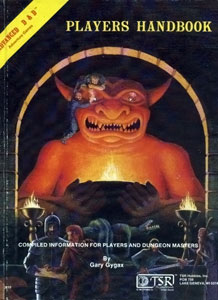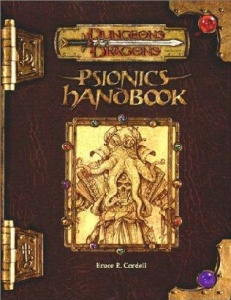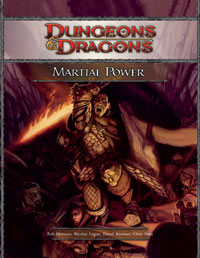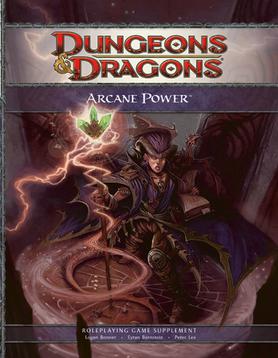In the Dungeons & Dragons fantasy role-playing game, psionics are a form of supernatural power similar to, but distinct from, arcane and divine magic.

The Player's Handbook is a book of rules for the fantasy role-playing game Dungeons & Dragons (D&D). It does not contain the complete set of rules for the game, and only includes rules for use by players of the game. Additional rules, for use by Dungeon Masters (DMs), who referee the game, can be found in the Dungeon Master's Guide. Many optional rules, such as those governing extremely high-level players, and some of the more obscure spells, are found in other sources.
The magic in Dungeons & Dragons consists of the spells and magic systems used in the settings of the role-playing game Dungeons & Dragons (D&D). D&D defined the genre of fantasy role-playing games, and remains the most popular table-top version. Many of the original concepts have become widely used in the role-playing community across many different fictional worlds, as well as across all manner of popular media including books, board games, video games, and films.

The Manual of the Planes is a manual for the Dungeons and Dragons role-playing game. This text addresses the planar cosmology of the game universe.

The Epic Level Handbook is a rule-book by Wizards of the Coast for the 3rd edition of Dungeons & Dragons. The book was published in 2001, and contains optional game rules for playing characters who have reached a higher experience level than is covered in the standard rules. This is referred to in the book as "epic level" play.

Complete Warrior is a supplemental rulebook for the 3.5 edition of the Dungeons and Dragons role-playing game, published by Wizards of the Coast. It replaces and expands upon an earlier rulebook entitled Sword and Fist.

Complete Adventurer is a supplemental hard-cover rulebook for the 3.5 edition of the Dungeons & Dragons game system published by Wizards of the Coast.

Complete Divine is a supplemental rulebook for the 3.5 edition of the Dungeons & Dragons fantasy role-playing game published by Wizards of the Coast. It replaces and expands upon earlier rulebooks entitled Masters of the Wild and Defenders of the Faith, as well as being a catchall for anything that does not fit into Complete Adventurer, Complete Arcane, Complete Warrior, or Complete Psionic.
A character class is a fundamental part of the identity and nature of characters in the Dungeons & Dragons role-playing game. A character's capabilities, strengths, and weaknesses are largely defined by their class; choosing a class is one of the first steps a player takes to create a Dungeons & Dragons player character. A character's class affects a character's available skills and abilities. A well-rounded party of characters requires a variety of abilities offered by the classes found within the game.
The monk is a playable character class in most editions of the Dungeons & Dragons fantasy role-playing game. A D&D monk is a fantasy martial artist, specializing in unarmed combat.

Complete Psionic is a supplemental rulebook for the 3.5 edition of the Dungeons & Dragons role-playing game published by Wizards of the Coast and released in April 2006. It is the first 3.5 edition supplemental rulebook published by Wizards of the Coast which focuses on psionics since the Expanded Psionics Handbook.

The Draconomicon is the title for several optional sourcebooks for the Dungeons & Dragons role-playing game, providing supplementary game mechanics for dragons specifically. Different Draconomicon books have been issued for the 2nd, 3rd, and 4th editions of the Dungeons & Dragons game. The Latin-inspired name of the books loosely translates as "Book of Dragon Names".

Complete Mage is a supplemental rule book for the 3.5 edition of the Dungeons & Dragons role-playing game. It is effectively the sequel to Complete Arcane.

The Psionics Handbook is a sourcebook published by Wizards of the Coast in 2001 for the 3rd edition of the Dungeons & Dragons fantasy role-playing game. It contains a multitude of rules and options for integrating psionic powers into the D&D game.

Martial Power is a supplement for the 4th edition of the Dungeons & Dragons fantasy role-playing game. It contains additional options and rules for fighters, rangers, rogues, and warlords, including new builds for each class to further customize a character, such as the "beastmaster ranger," "bravura warlord," and "resourceful warlord".

Monster Manual 2 is a supplement to the 4th edition of the Dungeons & Dragons role-playing game.

Arcane Power is a supplement for the 4th edition of the Dungeons & Dragons fantasy role-playing game.

Divine Power is a supplement for the 4th edition of the Dungeons & Dragons fantasy role-playing game.

Primal Power is a supplement to the 4th edition of the Dungeons & Dragons role-playing game.

Psionic Power is a supplement to the 4th edition of the Dungeons & Dragons role-playing game.















